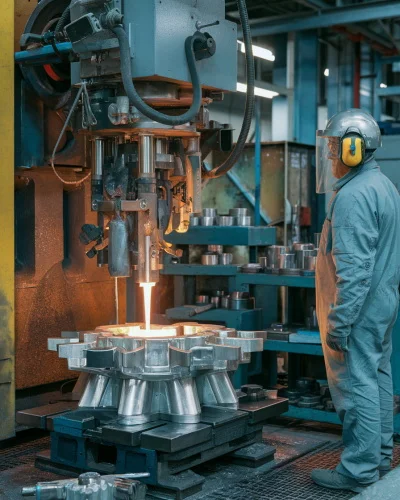The Utility of Alloy Die Casting: Zamak
The Utility of Alloy Die Casting: Zamak
Blog Article
Die casting alloys involve forcing molten metal at high temperatures into mold cavities. This procedure is effective for manufacturing accurate and smooth-surfaced metal components which are complex in nature. Different alloys are used for die casting; however, zinc alloys, especially Zamak, are far more noticeable due to their attributes and applications.

What is Zamak?
Zamak refers to a series of zinc alloys used in die casting. The term itself is a combination of the German words Zink, Aluminium, Magnesium and Kupfer which outlines its core constituents. Zamak alloys are characterized by their generous castability, low melting points, high fluidity, and good mechanical properties. Because of its remarkable features, Zamak is able to manufacture sophisticated and detailed components.
Zamak stilus are assigned numbers based on composition with Zamak 12 being one of the more famous variants. It is perfect for gravity fed sandcasting as it possesses adequate strength and durability whilst being economical.
Zamak's Applications in Daily Life
It may surprise you that zamak is a metal alloy that is found in various aspects of our daily lives. It is a low cost metal that is zamak becomes. It is mauz manufactured for components of tools and items in use starting from the household items to even in supremely intricate devices. Some common uses where zamak can be located are as follows:
Household items: Apart from household items like racks and handles of towels zamak is also used in making door fixtures and sinks. All these items require zamak metal because they can be made in different intricate designs using casting. Along with that their strength against corrosion make them ideal for such appliances.
Automotive industry: The light weight and strong nature of zamak makes it ideal for various emblems on cars. Many emblems, badges and other small parts zamak is employed for making them and all these products have great demand in the automotive industry.
Kitchen appliances: Zamak is also used in the manufacturing of kitchen aids where zamak provides an appealing look with a robust structure for the outer body of mixers.
Toys and models: zamak can greatly capture detail and thus is quite inexpensive which allows to make die casted toy cars and models.
Benefits of Zamak in Die Casting
Zamak possesses several traits that benefit die casting processes:
Lower Temperature Requirement: Zamak die casting’s simpler and more energy-efficient processes compared to aluminum is due to Zamak’s low melting point.
High Fluidity: The alloy has a high degree of fluidity, hence it gains access to intricate and complex parts, giving rise to highly detailed and multifaceted sections.
Cost-Effective: Due to Zamak’s low cost relative to other metals, it is a favorable choice for mass production.
Strength/Toughness: An array of applications can be considered with Zamak due to the alloy’s impressive strength, toughness, and durability.
Surface Finish: Parts made of Zamak are capable of being polished to give a polished attractive surface.
Concerned Considerations
While Zamak has fantastic features, there are aspects to Zamak features which require additional consideration:
Zinc Pest: Also referred to as zinc rot, this issue is the result of small amounts of lead contaminants in the alloy causing the material to deteriorate over time. This could be aided by adopting high-purity Zamak alloys. Weight: In specific applications, the lack of lightweight feel relative to aluminum may be seen as a disadvantage.
Strength: Zamak’s uses in high-stress environments may face limitations due to its reasonable toughness.
What Is The Importance of an Alloy Die Casting Manufacturer?
Choosing the right manufacturer is essential for getting quality die-cast parts. An alloy die casting manufacturer will have the required experience, equipment, and sophisticated technology to produce quality parts as per the specifications and standards set. Here are some reasons why working with a professional manufacturer is an advantage:
Experience: Professionals have the skills as well as the tools needed to select the most suitable alloy for your piece as well as the casting technique to be applied.Quality Control: These types of manufacturers have set procedures to enforce quality control which ensures each part is made and processed to the required standards.Flexibility: Manufacturers will always be willing to provide custom molds and designs tailored to the customer’s specifications and requirements which is a plus for many customers.Value for Money: Due to high competition, large scale manufacturers who use sophisticated technology can produce quality parts at a cheaper price, therefore reducing costs per unit.
Zamak is one of the most commonly used alloys in die casting due to its adequacy and reasonable cost. It is utilized in many products ranging from household items to car components. Zamak would be a preferred option for manufacturers due to the durability. However, like any material, Zamak has its limitations which are far outweighed by the benefits. Contact an alloy die casting contractor to achieve best quality parts.